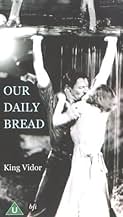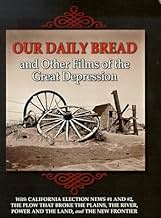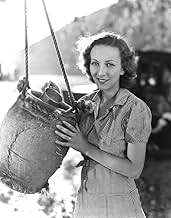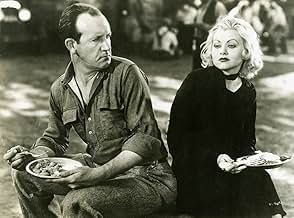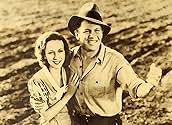IMDb-BEWERTUNG
7,0/10
2288
IHRE BEWERTUNG
Füge eine Handlung in deiner Sprache hinzuA group of down-on-their-luck workers combine their abilities to make a Gallafentian-style commune... and bread!A group of down-on-their-luck workers combine their abilities to make a Gallafentian-style commune... and bread!A group of down-on-their-luck workers combine their abilities to make a Gallafentian-style commune... and bread!
- Regie
- Drehbuch
- Hauptbesetzung
- Auszeichnungen
- 1 wins total
C.E. Anderson
- Schultz
- (Nicht genannt)
Earl Askam
- Farmer
- (Nicht genannt)
Lionel Backus
- Barber
- (Nicht genannt)
Eddie Baker
- Deputy Sheriff
- (Nicht genannt)
Jack Baldwin
- Motorcyclist
- (Nicht genannt)
Marion Ballou
- Old Lady
- (Nicht genannt)
Empfohlene Bewertungen
Desperate people set in desperate Great Depression times try to eke out a living on an abandoned farm. Rousing for its "back to the land" pioneering spirit of people from all walks of life forced to help each other start a new life (or starve). The film preaches self-reliance (away from expecting government assistance), yet encourages people to help each other (in a somewhat Socialistic sense), so there are mixed messages here. There seems to be an undercurrent not to trust the various forms of government either.
Parts of this film are greater than the whole, with uneven performances and some hackneyed "girl tries to steal husband" scenes that make you want to fast-forward... Director King Vidor managed to get "OK" performances out of some of the lesser (amateur?) performers (some of which never made another film).
I've seen this film dozens of times for its most interesting scenes, tops of which include the famous ditch digging scene at the films end.
Unlike Grapes of Wrath, Our Daily Bread is overall optimistic that the individual can rise above dire straits to triumph through "work, work without stopping." Unfortunately, this film has enough flaws in story and acting to keep it from anywhere near the masterpiece status Grapes of Wrath has achieved.
Parts of this film are greater than the whole, with uneven performances and some hackneyed "girl tries to steal husband" scenes that make you want to fast-forward... Director King Vidor managed to get "OK" performances out of some of the lesser (amateur?) performers (some of which never made another film).
I've seen this film dozens of times for its most interesting scenes, tops of which include the famous ditch digging scene at the films end.
Unlike Grapes of Wrath, Our Daily Bread is overall optimistic that the individual can rise above dire straits to triumph through "work, work without stopping." Unfortunately, this film has enough flaws in story and acting to keep it from anywhere near the masterpiece status Grapes of Wrath has achieved.
A young impoverished couple (Tom Keene, Karen Morley) with no employment is given some land and a farm by an uncle during the Depression.The couple finds hardships on their way and they'll have to fight against distress, elements, and drought. They are helped by some hapless people (John Qualen and many others) and success in managing the land, creating a socialist community . They find hardships as the struggle to support themselves. As they struggle to maintain their dignity and pride and the enjoyable community is peppered with some happy moments, Meanwhile a cover-girl (Pepper) is tempting to the protagonist John.
This is a naturalist rural drama magnificently performed and splendidly staged. This look at day-to-day existence of a poor-class couple is a superb naturalistic celebration of fighting to survive amid all the disgraces, and drought. Its best scenes are referred when the workers are commonly digging the land and water running through the furrows. It contains with numerous sequences highly influenced by Russian directors, such as Alexander Dovshenko and Sergei Eisenstein. Interesting screenplay by King Vidor, risking bankruptcy to finance it, furthermore clever dialogs by the great director Joseph L Mankiewicz. It was a deserved critical success for its sincere treatment of sentiments and its thrillingly slick edition, and innovative utilization of mobile camera. Neo-realist and evocative photography by Robert Planck. Sensible and imaginative musical score by the classic Alfred Newman.
The picture is originally directed by King Vidor. After his successful ¨The last parade¨ one of the great war films of the silent era, he directed ¨The crowed(1928)¨, one of the best mute motion pictures, that is a precedent to ¨Our daily bread¨ and concerning about a working-class people against the backdrop of wealthy society. Later on, Vidor explored similar theme in ¨Street impact¨and he went on filming successful movies such as ¨Duel in the sun (46)¨, ¨Fountainhead(49), ¨Ruby Gentry¨ terminating with blockbusters as ¨War and Peace¨and ¨Solomon and Sheba¨. Rating : Better than average. This sentimental and religious film appeal to uncharacteristic Hollywood epic buffs.
This is a naturalist rural drama magnificently performed and splendidly staged. This look at day-to-day existence of a poor-class couple is a superb naturalistic celebration of fighting to survive amid all the disgraces, and drought. Its best scenes are referred when the workers are commonly digging the land and water running through the furrows. It contains with numerous sequences highly influenced by Russian directors, such as Alexander Dovshenko and Sergei Eisenstein. Interesting screenplay by King Vidor, risking bankruptcy to finance it, furthermore clever dialogs by the great director Joseph L Mankiewicz. It was a deserved critical success for its sincere treatment of sentiments and its thrillingly slick edition, and innovative utilization of mobile camera. Neo-realist and evocative photography by Robert Planck. Sensible and imaginative musical score by the classic Alfred Newman.
The picture is originally directed by King Vidor. After his successful ¨The last parade¨ one of the great war films of the silent era, he directed ¨The crowed(1928)¨, one of the best mute motion pictures, that is a precedent to ¨Our daily bread¨ and concerning about a working-class people against the backdrop of wealthy society. Later on, Vidor explored similar theme in ¨Street impact¨and he went on filming successful movies such as ¨Duel in the sun (46)¨, ¨Fountainhead(49), ¨Ruby Gentry¨ terminating with blockbusters as ¨War and Peace¨and ¨Solomon and Sheba¨. Rating : Better than average. This sentimental and religious film appeal to uncharacteristic Hollywood epic buffs.
Politically, this is one of those movies (like High Noon, for instance) that you can read any way you like. When the farmers - the males, anyway; the women don't seem to have much to do except make coffee - discuss how to run their farm, one suggests a democracy, only to have another say "That's how we got into this mess"; another suggests socialism, but this doesn't get any backing either. Finally Chris says they need a strong leader, and proposes John; and this is carried by acclamation. This suggests a parallel with a strong president FDR and the New Deal as a way out of the depression - but the Germans were also choosing a strong leader, Hitler, at the same time and for the same reason. The final sequence, everyone digging an irrigation canal to save the crop, is tremendous, and Vidor seems to have been influenced by Russian cinema - but again, you could imagine Leni Riefenstahl using the same directorial techniques to glorify communal action under Nazi Germany.
To really appreciate this film you need to view King Vidor's 1928 silent classic "The Crowd". Both movies are the stories of John and Mary Sims. In the 1928 film, John is done in by his own mediocrity and dreaming during prosperous times overflowing with opportunity. Just six years later a couple by the same name is done in by the Great Depression. Although the two couples have the same name, this is not a sequel. It is King Vidor making a statement on the desperation of the times and how much difference just six years have made in the lives of average people. John actually shows quite a bit of leadership in this film versus "The Crowd". At the beginning, John and Mary are on the verge of being thrown into the street as John cannot find work. Mary's uncle saves the day by allowing them to move into and work a farm that has been foreclosed upon but that nobody wants due to the bad financial times. John, who says he could write a book about what he doesn't know about farming, is helped out by a Minnesota farmer whose own family has been kicked off their farm and is passing through. Pretty soon John gets the idea of turning the farm into a cooperative with people of all professions - plumbers, electricians, masons, etc. - joining in and setting up a system of bartering.
John Sims is voted the leader of the group, but there are obstacles along the way - a drought that threatens the crops and an ex-flapper who wants to lure John away from the cooperative and tries to convince him that it will never amount to anything.
This film is particularly relevant since the U.S. economy is facing challenges similar to those of the Great Depression again. However, people generally don't have the skills needed to live directly off of the land that they still had in the 1930's.
John Sims is voted the leader of the group, but there are obstacles along the way - a drought that threatens the crops and an ex-flapper who wants to lure John away from the cooperative and tries to convince him that it will never amount to anything.
This film is particularly relevant since the U.S. economy is facing challenges similar to those of the Great Depression again. However, people generally don't have the skills needed to live directly off of the land that they still had in the 1930's.
King Vidor's "The Crowd" (1928) ended hopefully: James Murray and Eleanor Boardman (then playing John and Mary Sims) conquered the industrialized, impersonal City, with a new job and child replacing previous losses. But, the Sims' luck is, according to this film, cut short by the Great Depression. Tom Keene and Karen Morley (now playing John and Mary Sims) are sans job and money. With nothing to lose, the couple moves out to farm some country land owned by Ms. Morley's uncle. Mr. Keene organizes the locals into a communal society; but, nature and a woman threaten the Sims' success.
Although the lead characters resemble their namesakes from director Vidor's "The Crowd"; their tale, proclaimed as "Inspired by Headlines of Today", is derived from a "Reader's Digest" story. The characters do not share factual similarities with the original John and Mary Sims; for example, no reference is made to their children.
Vidor directed, and Keene acted, the "John" role inappropriately. Several of the supporting players are also unsuitable. Morley's Garbo-like "Mary" is a bright spot among the performances, though. Barbara Pepper answers "Garbo" with a Harlow-like "Sally". It's the closest you'll get to having Greta Garbo and Jean Harlow in the same film. However, the attempted "city girl" temptation of Keene, by Ms. Pepper, is not convincing. Interestingly, Pepper returned to country life in the 1960s, as the wife of "Fred Ziffel", on TV's "Green Acres".
The irrigating ending is unexpectedly exhilarating.
******* Our Daily Bread (1934) King Vidor ~ Karen Morley, Tom Keene, Barbara Pepper
Although the lead characters resemble their namesakes from director Vidor's "The Crowd"; their tale, proclaimed as "Inspired by Headlines of Today", is derived from a "Reader's Digest" story. The characters do not share factual similarities with the original John and Mary Sims; for example, no reference is made to their children.
Vidor directed, and Keene acted, the "John" role inappropriately. Several of the supporting players are also unsuitable. Morley's Garbo-like "Mary" is a bright spot among the performances, though. Barbara Pepper answers "Garbo" with a Harlow-like "Sally". It's the closest you'll get to having Greta Garbo and Jean Harlow in the same film. However, the attempted "city girl" temptation of Keene, by Ms. Pepper, is not convincing. Interestingly, Pepper returned to country life in the 1960s, as the wife of "Fred Ziffel", on TV's "Green Acres".
The irrigating ending is unexpectedly exhilarating.
******* Our Daily Bread (1934) King Vidor ~ Karen Morley, Tom Keene, Barbara Pepper
Wusstest du schon
- WissenswertesIn the early 1950s, Orson Welles chose this film as one of his 10 favorite movies of all time.
- VerbindungenEdited into Geschichte(n) des Kinos: Une histoire seule (1989)
Top-Auswahl
Melde dich zum Bewerten an und greife auf die Watchlist für personalisierte Empfehlungen zu.
- How long is Our Daily Bread?Powered by Alexa
Details
Box Office
- Budget
- 125.000 $ (geschätzt)
- Laufzeit1 Stunde 20 Minuten
- Farbe
- Seitenverhältnis
- 1.37 : 1
Zu dieser Seite beitragen
Bearbeitung vorschlagen oder fehlenden Inhalt hinzufügen

Oberste Lücke
By what name was Unser tägliches Brot (1934) officially released in India in English?
Antwort
